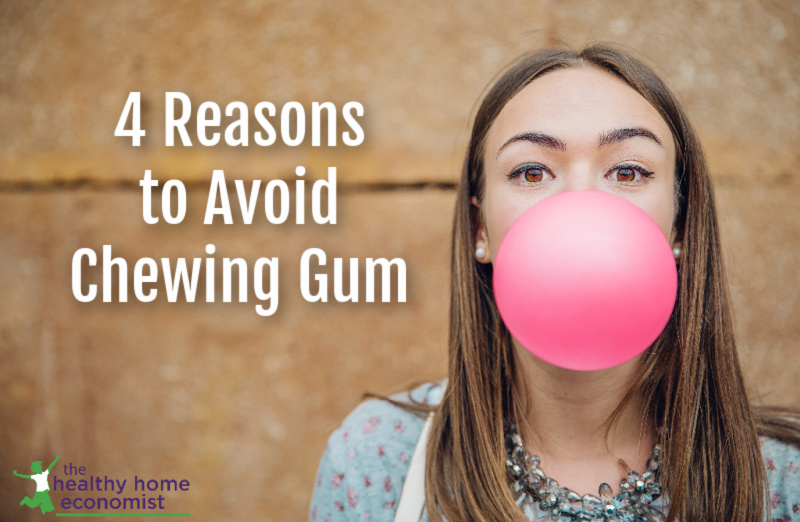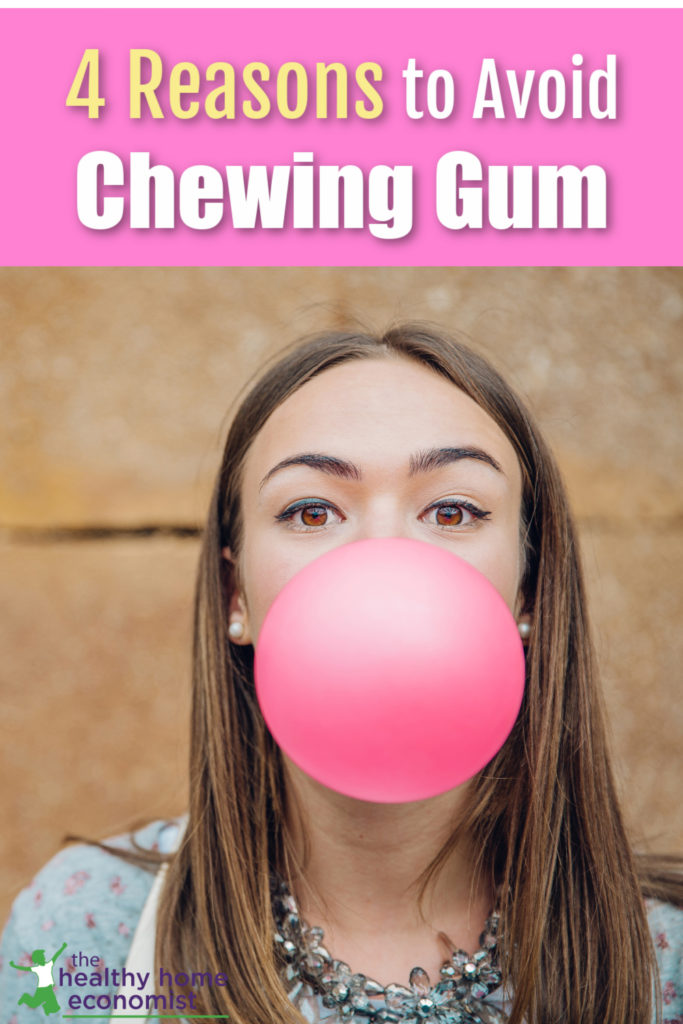The dangers of chewing gum frequently or for more than a few minutes at a time and why it can contribute to the development of digestive disorders and mercury toxicity among other problems. This habit can be particularly problematic during pregnancy.

Chewing gum is a popular activity for people of all ages. I remember becoming quite proficient at blowing very large bubbles at summer camp one year. From then on, chewing bubble gum became a favorite childhood pastime of mine. Besides the bubble blowing, I got pretty good at peeling the gum off my face too!
While chewing gum may be fun and a good way to kill time or stave off boredom, is it a healthy activity? It seems like some folks chew gum every single day. Are there any health issues to be aware of from too much chewing?
Chewing Gum is Full of Chemicals and Artificial Sweeteners
Probably the number one reason to avoid most chewing gums is that they are loaded with chemicals, additives and synthetic ingredients.
GMO corn syrup, artificial colors and flavors, aspartame, sucralose, or other unhealthy sweeteners like xylitol (and the list goes on) are enough to cause any label reading parent to steer clear of these seemingly harmless treats.
It is surprising how some caregivers who would never dream of giving a child a diet soda don’t think twice about doling out sugarless gum with similar potential for neurotoxicity.
Healthfood stores do offer some decent alternatives, but in my experience kids don’t seem much interested in them.
They want the brands their friends chew that come in the the brightly colored packaging and have everlasting synthetic flavors that don’t diminish even after many minutes of chewing.
To keep things simple, I’ve made the habit of simply not buying gum at all. If I really need to chew something on occasion, I keep this healthy gum alternative in the pantry.
My kids do occasionally get a wad of gum at parties and whatnot. We don’t live in a bubble, so this is going to happen occasionally. But, this is an exception rather than the rule. I do try to make sure they don’t chew it for long though!
Uses Up Valuable Digestive Enzymes
It is not well known that the amount of digestive enzymes your body can produce in a given lifetime is relatively finite. Chewing stimulates the secretion of digestive enzymes to prepare for food that never arrives in the stomach.
Doesn’t it seem like a waste to use up your precious digestive enzyme reserve of these valuable, live proteins on such a useless activity?
If you chew gum frequently between meals, it is very feasible that you are using up your digestive enzyme reserves so that the next time you eat, you won’t have enough digestive enzymes on hand to fully digest the meal.
It is conceivable then, that frequent gum chewing gum can provide the perfect backdrop for the development of digestive disorders.
And, if you already suffer from digestive complaints, gum chewing should definitely be avoided!
Contributes to the Development of TMJ and Other Jaw Problems
Oral surgeons at UT Southwestern Medical Center in Dallas contend that too much gum chewing causes jaw stress.
Dr. Sinn, a UT Southwestern oral surgeon, warns that jaw soreness, jaw “clicking” or pain in the jaw, head, or neck can be signs of TMJ syndrome and that gum chewing should be discontinued should such symptoms emerge.
Given that gum chewing is commonly used to relieve stress, Dr. Sinn suggests other methods for reducing tension such as squeezing a ball, relaxation techniques or regular exercise to avoid the risk of chronic jaw problems.
Gum Releases Mercury from Amalgam Fillings
Probably the most important reason to abstain from chewing gum is that it releases mercury from dental amalgam fillings.
A Swedish study found that people with silver fillings who chew gum for 5 hours or more each day had significantly higher levels of mercury in their blood and urine than those people with silver fillings who chewed gum infrequently.
Mercury levels in the blood, urine, and breath at exhalation increased in proportion to the number of silver fillings each study participant had.
Given that mercury is neurotoxic in any amounts in the body, it seems that chewing gum with silver fillings is best avoided. This is the case even if a person has only one silver filling.
Skip the Gum if Pregnant
For pregnant women with silver fillings, chewing gum can prove toxic to the fetus should any mercury whatsoever be released into the bloodstream.
Many pregnant women chew gum to help relieve heartburn or indigestion. Yet, the dangers of this activity if one has dental amalgams are not readily provided at prenatal visits even though mercury easily crosses the placenta.
And no, removing silver fillings while pregnant is not the solution either as it can do more harm than good. Just don’t chew gum during this time!
Can Chewing Gum Ever Be Helpful?
I remember after one particular dental visit years ago, my jaw became painfully sore.
The dentist had obviously overextended the jaw joint and the inflammation and pain was really excruciating for days on end. I tried to not talk much and eat only soft liquid foods to no avail. The joint just didn’t seem to get any better.
Finally, I decided I would try to strengthen my jaw by chewing gum for brief periods of time. This was an attempt to slowly rehabilitate it. An oral form of physical therapy, if you will.
After about a week of chewing gum for short intervals each day, my joint pain began to dissipate. Another week, and it disappeared completely. After that, I stopped chewing gum and the pain still did not return.
Chewing gum might also be helpful after meals when additional enzymes are needed for digestion. Chewing gum for a few minutes after eating does seem to help some folks avoid indigestion, heartburn, or reflux.
In some circumstances such as these, chewing gum can be therapeutic. In most cases, though, it should be avoided as an activity that really is not very health promoting.

References
(1) Chewing Gum Releases Mercury into Blood and Urine
(2) Health Watch – Gum Chewing







Just about the only time I chew gum these days is when traveling — to relieve ear pressure while flying. Yawning helps too, but if I have any kind of congestion from allergies or a cold, I need the gum.
I used to chew gum for breath purposes, but I noticed that ever since I started eating real food, and significantly decreasing my intake of the standard stuff, I haven’t felt the need to. I even brush my teeth less frequently! They just don’t feel like they need it more than once a day or so. I still eat plenty of grains and starches though (I am trying to gain weight), so I’m a little surprised by that, since I know that those can be big culprits of oral health problems, tooth decay, etc. Eh, fingers crossed, I guess!
I haven’t chewed gum in thirty years, didn’t really see the point and did see the negatives, as Sarah has shown us. However my lifestyle puts me away from home for whole days, often without the opportunity to brush my teeth. I read that chewing sugarless gum was good for avoiding cavities so I was interested in reading this post.
However, despite its true info, the fact is, the two sources only warn against overuse. I mean, five hours of chewing gum per day(the amount the warning in Source #1 was based on), that’s a lot, at least to me. Do very many people chew that much? If we take that use down to an hour or less, to gain any specific benefits, is it any worse than any of the other things we do? Everything has a downside if we overdo. The second source didn’t even state how much was too much. Like everything, if we hurt, if we feel a bad result, we should stop. If we do anything at all for a very long time, we should examine our choices and consider if we’re doing a good thing for ourselves.
We can overdo anything – gum, meat, dairy, fat, exercise, we can even love someone too much. This particular post doesn’t seem like such a great perspective, to warn us against overdoing when probably hardly any of these readers chew five hours of gum a day. Unless the true point of the post is about overdoing, and how anything can be harmful if done in excess.
My question would be, is there a gum that might help us in any way and how, and is there any research that states that if we use gum judiciously, can we still expect to experience major detrimental effects? It’s hard to give up everything, and is this really an important thing to give up, if we see a beneficial use.
Sarah, I’m like you and a lot of your readers, I want to do everything the best I can. It’s just such an imperfect world and I think we have to keep that in mind or we’ll go nuts. Thankyou Sarah, for opening up this issue. Maybe there’s more info out there somewhere on this question?
I think the biggest takeaway here is just being aware of all the nasty, chemical, fake-food ingredients found in most chewing gum — if we wouldn’t eat those ingredients in a food product, we shouldn’t be chomping on them in gum form, either. I know my own mother, for example, fails to see the problem with consuming chemical sweetener-laden mints and gum, and she’s the one who introduced me to real food!
I do miss gum and I’ll occaisionally buy Glee from our grocery store
Sarah, I enjoy your posts. You give lots of great info. I pass the links on to friends. Thanks for all you do!
What have you found to be the best toothpaste?
Gum is also made out of plastic: http://www.mnn.com/lifestyle/responsible-living/photos/16-simple-ways-to-reduce-plastic-waste/give-up-gum.
Spry sweetened with xylitol is a good gum choice. It’s not bubble gum, though. I get it at my local health food store. I use it for a quick breath freshener when I’m out.
A good brand of chemical-free gum is Glee (http://gleegum.com/). It’s made with natural chicle from tree sap, the way gum used to be, and it doesn’t contain artificial sweeteners or preservatives or any toxic stuff. The flavor doesn’t last forever, that’s the only drawback, but it lasts long enough to freshen your mouth after eating. I have digestive issues and so have learned to chew gum only after meals, and not between meals so I don’t waste those digestive enzymes!
Chewing gum gives me a migraine in no time. I have thought it was the tension being created by chewing and chewing. Additives could be playing a part too though.
Xylitol is a sweetener from birch trees. Trident gum uses it in some of their gums, but there’s still the other stuff. I have chewed wax before, but I am not an avid chewer.
My husband chews gum a lot and so my son now loves to chew gum (he’s 4) and I don’t like it but have let him. Not anymore! His gum chewing days are over! I might be able to convince my husband to so the same..but we will see how that goes.